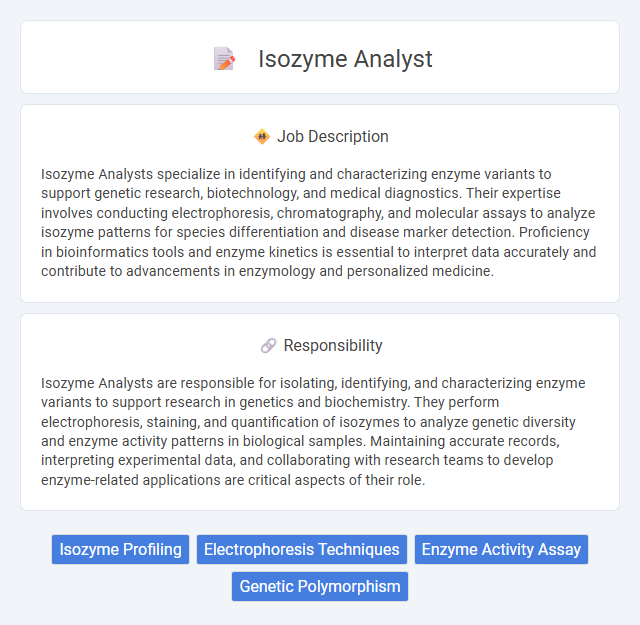
Isozyme Analysts specialize in identifying and characterizing enzyme variants to support genetic research, biotechnology, and medical diagnostics. Their expertise involves conducting electrophoresis, chromatography, and molecular assays to analyze isozyme patterns for species differentiation and disease marker detection. Proficiency in bioinformatics tools and enzyme kinetics is essential to interpret data accurately and contribute to advancements in enzymology and personalized medicine.
Candidates with strong analytical skills and a background in biochemistry or molecular biology are likely suitable for an Isozyme Analyst position, as the role involves detailed examination of enzyme variants. Individuals who excel in laboratory environments and can maintain high attention to detail probably find this job fitting. Those who struggle with repetitive tasks or have limited experience in enzyme analysis might face challenges in adapting to this role.
Qualification
Isozyme Analysts must possess strong expertise in biochemistry and molecular biology, typically requiring a bachelor's or master's degree in a related field. Proficiency in gel electrophoresis, enzyme kinetics, and data analysis software is essential for accurate isozyme identification and interpretation. Experience with laboratory techniques, quality control protocols, and regulatory standards enhances an analyst's ability to deliver reliable results in pharmaceutical or agricultural research environments.
Responsibility
Isozyme Analysts are responsible for isolating, identifying, and characterizing enzyme variants to support research in genetics and biochemistry. They perform electrophoresis, staining, and quantification of isozymes to analyze genetic diversity and enzyme activity patterns in biological samples. Maintaining accurate records, interpreting experimental data, and collaborating with research teams to develop enzyme-related applications are critical aspects of their role.
Benefit
Isozyme Analyst roles likely offer substantial benefits centered on specialized expertise in enzyme analysis, potentially leading to competitive salaries aligned with biochemistry and pharmaceutical sectors. Opportunities for professional growth may exist through hands-on experience with cutting-edge technologies in isozyme profiling, enhancing career advancement prospects. The position might also provide a collaborative environment with interdisciplinary teams, fostering skill development and research innovation.
Challenge
Working as an Isozyme Analyst likely involves the challenge of accurately identifying and quantifying enzyme variants in complex biological samples, which requires advanced technical skills and attention to detail. There may be uncertainty in interpreting isozyme patterns due to overlapping bands or variations in expression, posing difficulties in data analysis. The role probably demands continuous learning to keep up with evolving methodologies and instruments in enzymology.
Career Advancement
Isozyme Analyst roles offer significant career advancement opportunities through specialization in enzymology and biochemical data analysis. Professionals develop expertise in characterizing enzyme variants, enabling progression to senior research positions or leadership roles in biotechnology and pharmaceutical industries. Mastery of advanced analytical techniques and data interpretation enhances prospects for project management and strategic decision-making responsibilities.
Key Terms
Isozyme Profiling
Isozyme Analysts specialize in isozyme profiling to identify enzyme variants that serve as genetic markers for species differentiation, disease diagnosis, and biochemical pathway analysis. Utilizing techniques such as gel electrophoresis and densitometry, they accurately separate and quantify isozyme patterns to support research in genetics, agriculture, and clinical diagnostics. Expertise in interpreting isozyme banding patterns enables the development of targeted therapies and enhances crop breeding programs.
Electrophoresis Techniques
Isozyme Analysts specialize in the application of electrophoresis techniques to separate and identify enzyme variants within biological samples. Proficiency in methods such as polyacrylamide gel electrophoresis (PAGE) and isoelectric focusing is essential for accurate isozyme profiling and genetic variation analysis. Expertise in interpreting electrophoretic patterns facilitates advancements in disease diagnosis, biodiversity studies, and biotechnological research.
Enzyme Activity Assay
Isozyme Analysts specialize in conducting enzyme activity assays to measure and compare the catalytic properties of different isozymes, providing critical data for biochemical and pharmaceutical research. They utilize spectrophotometric, fluorometric, or chromatographic techniques to quantify enzymatic reactions under various conditions and identify isozyme-specific kinetics. Proficiency in data interpretation, assay optimization, and maintaining enzyme purity ensures accurate characterization of isozyme function and regulation.
Genetic Polymorphism
Isozyme Analyst roles focus on examining genetic polymorphism by analyzing enzyme variants to detect genetic diversity within populations. They utilize electrophoresis and molecular techniques to identify isozyme patterns linked to hereditary traits and disease susceptibility. Expertise in interpreting polymorphic enzyme data supports applications in genetics research, breeding programs, and personalized medicine.
 kuljobs.com
kuljobs.com